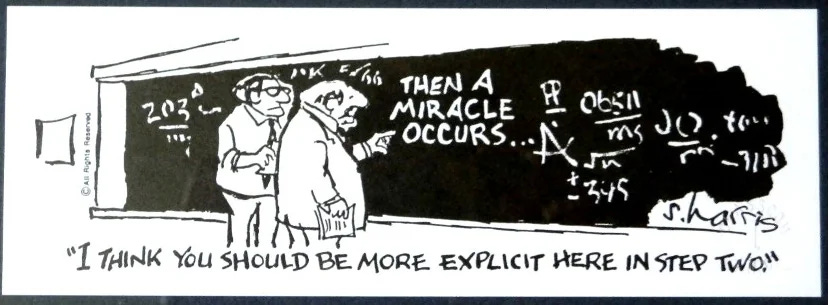Turtles All The Way Down
Statements of Faith In Life and Science
Welcome to Polymathic Being, a place to explore counterintuitive insights across multiple domains. These essays take common topics and investigate them from different perspectives and disciplines to come up with unique insights and solutions.
Today's topic addresses the concept that almost everything requires a statement of faith and that we are largely completely comfortable with this. Unless it’s a different statement of faith than our own. Lest we think this applies only to religion, science requires the same so that we can explore the complex world around us.
Introduction
“Modern science is based on the principle: ‘Give us one free miracle and we’ll explain the rest.’ The one free miracle is the appearance of all the mass and energy in the universe and all the laws that govern it in a single instant from nothing.”
- Terence McKenna - Ethnobotinist
No matter how far you go into the depths of science we always reach a point where we make a statement of faith. It’s unavoidable. Perhaps humans will get to the point where we find the bottom but that’s not likely to come soon.
Until then it’s Turtles All the Way Down.
Hindu Mythology
"Turtles all the way down" is rooted in Hindu mythology which describes the World Turtle which held the Earth on its back. What was holding the turtle up? Another turtle silly. And under that? Well, you get the point.
At the core, it expresses the problem of infinite regress. This is an argument that does not solve the problem it was formulated to solve. Instead, it assumes already, in disguised form, what it was supposed to explain.
Much of our science avoids this regress by just stopping and placing a statement of faith. Yet that statement is not much different than the Hindu acceptance of more turtles but at least science stops the regress.
Statements of Faith in Science and Technology
Popular culture, specifically on social media has started to treat science as if it were absolute and unquestionable. They tend to turn the entire discipline into its own religion of sorts, not unlike the ancient Hindus. It’s a paradigm we explored long ago right here in Polymathic Being
Instead of accepting that they’ve claimed a statement of faith, many seem to treat a messy exploration into reality as if it were based on a religious presupposition. The thing is, a statement of faith in science is merely called an axiom or a first principle.
Whether we call it a first principle or a statement of faith it all boils down to the same thing; we have to put a pin in a concept and start working from that foundation. It’s not right or wrong. The only thing that can make it wrong is when we fail to name and understand it properly.
John Horgan, writing for Scientific American, captures this as a concept of ‘good enough.’ We can’t know all things perfectly and so we make trades and we pin down axioms to begin developing a workable model that reduces the unknown.
Mr. Horgan articulates the quandary of this as:
“Some people confuse agnosticism (not knowing) with apathy (not caring).”
The main thing to consider is that we have to have these statements of faith but we have to book-end that with the recognition of not knowing. Too many people take these axioms and accept them without caring about their intended purpose. This apathy turns a useful tool into a religious adherence that perverts science into the religious ideology that frustrates us.
The key, as with many of the things we’ve explored here in the past, is to be OK with not knowing everything and balance that against a clear understanding of why you’ve picked the axioms you have. Crucially it’s also understanding when these axioms, first principles, and statements of faith no longer work for further exploration and to allow them to change.
In Application
When I was working on systems engineering frameworks to enable better design of autonomous and AI-enabled systems, I had a co-worker who would constantly be lost in “turtles all the way down.” The challenge was that there was never enough knowledge to be perfectly right.
But we didn’t have to be perfect. We had to be actionably correct. This slight nuance is incredibly important to be able to take action in a messy world. It became a running joke with this co-worker, specifically when we were working on the ethereal concept of trust in relationship to autonomous agents, that there was always a “but what about?” indicating a point that we’d have to pin as a statement of faith and move on.
To help move the project along I went online and bought both him and me an ornament of Yertle the Turtle from Dr. Suess fame and gifted it as a reminder that, sometimes, we need to stop stacking turtles and find a level we could place a statement of faith that could allow us to move on.
Statements of faith, also known as first principles, axioms, and assumptions, are critical enablers in our complex world as long as you recognize and accept it is a statement of faith and prevent it from being ossified into a religious tenant vs. a dynamic tool we can use to foster innovation.
Enjoyed this post? Hit the ❤️ button above or below because it helps more people discover Substacks like this one and that’s a great thing. Also please share here or in your network to help us grow.
Polymathic being is reader-supported. These essays are all free but your financial support goes a long way to helping keep these open for everyone!
Further Reading from Authors I really appreciate
I highly recommend the following Substacks for their great content and complementary explorations of topics that Polymathic Being shares.
Goatfury Writes All-around great daily essays
Never Stop Learning Insightful Life Tips and Tricks
Cyborgs Writing Highly useful insights into using AI for writing
One Useful Thing Practical AI
Educating AI Integrating AI into education
Mostly Harmless Ideas Computer Science for Everyone








I came here for a heartwarming tale about turtles sliding down a waterslide.
And yet, I do not walk away disappointed. There's definitely a gap between how many of us perceive science and scientists (as the ultimate truth bringers) vs. how the scientific method works in most cases (observing, making and testing hypotheses, and continuously updating your worldview based on the best available data and explanation).
Now I'm off to start building that turtle waterslide.
I'm so glad you said this part: "Statements of faith, also known as first principles, axioms, and assumptions, are critical enablers in our complex world as long as you recognize and accept it is a statement of faith and prevent it from being ossified into a religious tenant vs. a dynamic tool we can use to foster innovation."
Science doesn't say to believe in axioms no matter what, nor take as an act of faith that the big bang happened, but popular culture certainly makes it seem as though it does... and most people who are casual observers of science are virtually certain to conclude that science is a field where people claim to "know things for sure."
Every professional scientist I've known has been the exact opposite of this, constantly questioning everything we "know."
If anything, skepticism is the default setting... even about axioms.